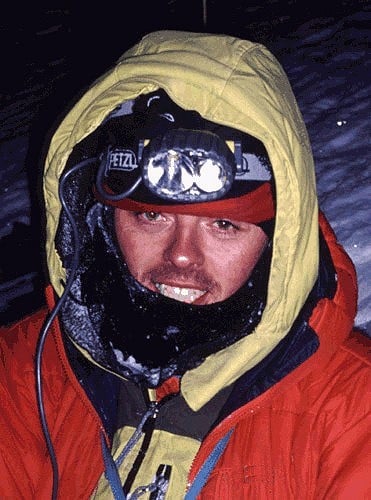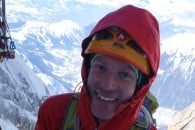
Andy Kirkpatrick hosts an interactive gear question forum on UKC. You can ask Andy questions in this Premier Post. Here he answers some questions about his new book Psychovertical; How he made the transition from magazine writer to author, what his plans are for the future and which other climbing authors he rates...

The book aims to answer that million dollar question: Why do we climb?, by telling a multi-layered story of one climb, and one climber, looking back at every climb and experience that led up to it. The main strand is my 12 days on the Reticent wall in 2001, with each chapter covering one day on the climb. In between each of these chapters their are the stories of growing up, learning to climb, and the climbs that led up to the Reticent, with the last climb leading in to the start of the Reticent. Luckily for me the crux of the Reticent was the second to last pitch, so the whole book builds nicely to this show down. Hopefully the result of this structure is that although people (i.e. Non climbers), may be wondering why I would set off to solo such a route, by the end they would know why.
So what's the answer to that million dollar question?
I'm afraid the answer is 95,000 words long, and of course only applies to me.
Where did the title come from?
Silvo Karo and a Slovene team did a new route on Torre Egger called Psychovertical, plus it's the name of my website, but for this book it relates to an incident on the last day when someone started shouting down the wall that I was a psycho.
When did you decide to write a book?
I've had the idea for years, ever since I climbed the route. The funny thing is I never wrote about the climb, and it kind of took a few years to work out why I did it, as it was far beyond me at the time. I sketched out the structure of the story, but never really got down to it until last year, as any kind of creative writing took a back seat to gear articles!
So what changed?
In 2005 I got a place on a three week writing program at the Banff centre in Canada. As it turned out Id already agreed to do a talk for the charity Porters Progress at the Royal Geographical Society, so had to turn it down, but being a believer in Karma, I hoped I'd get on the following year, which I did.
The program was very intense, writing everyday, with an editor checking your stuff, and with no kids or work to disturb me, and I was able to believe I could maybe finally write the book.
Did you find it hard getting a publisher?
Simon Yates had given me the number of Tony Whittom, his editor at Random House a few years previously, and I'd send him some stuff to read. He's been keen to meet up and talk about it, but I just let it sit and sit. I knew that any budding writer would sell their mother to have a meeting with someone like Tony, but I suppose I was both scared of following it through, and I think I knew I wasn't ready.
Fate plays a big part in these things, and I found that Tony was my editor at Banff, so we worked really closely on my writing. Tony's a climber, and has worked with a lot of climbers (Simon Yates, Jim Perrin, Andy Cave), so he got it from the start.
After Banff Tony was keen to publish my book, but in the end I got an agent and they shopped around for the best deal. It's vital for any new author to get as high an advance as possible, not for the money, but so the publisher really has to work hard on promoting the book. In the end Random House got the book and then the hard part began.
How hard was it writing a book versus writing for magazines?
I was lucky in that I'd been writing around 4000 words a month for about 4 years, so was used to the work load. The first thing I did was stop working for Climb, as writing my column (gear, A to Z and My life led up to this) would have been impossible, plus I felt I'd got to the end of the road with writing about gear.
Tony had given me a word count of 90,000 words, so the first thing I did was cut and paste all my old stories into my book document, which gave me about a 30,000 word head start, or at least that's what I thought. In the end almost every thing I'd written, and was hoping to just shoehorn into the book, needed rewriting, either because it didn't fit the style of the book, or because I just found it wasn't as well written as I'd thought.
How do you go from 4000 word articles to 90,000 word books?
Writing a short story is like building a shed, if you pay attention, and apply all you know, you should knock up something that does the job. Writing a book is like building a house, and a big one at that. If you make any mistakes it can affect the whole structure, and the house will be judged not by it's best room, but by its worst. Very often in the writing process I completely despaired that I could do it, or that I was good enough to write the book that I'd wanted to write. I suppose I have always been my harshest critic, and eventually I just had to write it as well as I could.
How did you write the book?
I spent a year sitting a cafés in Sheffield, mainly in Encliffe and Millhouses park, spending about six hours a day just writing. Actually my favourite place to write was the Yorkshire Sculpture park, good food, and a good view! For some reason I couldn't write anywhere quiet, probably due to being used to two kids running round the house.
As for the writing itself, it's funny but some chapters would be written in a day, while others took months, but whatever time it took it was always important to let it sit a week or two before going back to edit it.
How did this affect your climbing?
I've always been a part time climber, so going for a month or two without climbing was OK. I went to Patagonia with Ian Parnell and Yosemite with Karen Darke, but where ever I went my Mac Book was always by my side.
What do you think of climbing writing?
I think writing about climbing, and making it interesting is tough, especially if you're writing to both climbers and non climbers. I thought early on that it was important to get a style that worked for me, and after many years of trying I ended up believing that a light touch was best for me, and what lay in the spaces between the words was just as important as the words themselves. Too many writers try and paint the full picture when it's not necessary. One of the most important things I learnt about writing was you must never tell the reader how you feel, only the situation you are in, so that they can empathize with the writer.
Who are your favourite climbing writers?
I've always liked writers like Ed Drummond, and think his dream of white horses book is great. I also like Andy Cave's writing, and some of Mark Twight's stuff (but not all). I guess I like an honest writing style, and ideally with the minimum of stuff about actually climbing!
What are your future plans?
I always envisaged Psychovertical as part one of a trilogy of books, and have the next one all mapped out. Psychovertical deals with what motivates a person to climb, where as the next book deals with how this affects others. But before that I need to get my ass in gear and start climbing, rather than just writing about it!
Psychovertical is published by Hutchinson, and is available from September the 18th.
Signed copies can be bought from Andy's website HERE










Comments